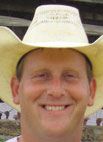
Good business decisions, family involvement and good land purchases have led to the success and growth of the Clark family’s owned and operated businesses. Dr. Robert Clark started The Flying C Ranch with 16 cow/calf pairs as a hobby and business has grown over the years to include 600 acres, 150 momma cows, four registered bulls, Clark’s Pecan Grove and a hay business. They have made careful observations of the industry along the way. What started as a hobby is now the family profession.
In 1980, Dr. Robert Clark, a surgeon at the time, bought 55 acres 8 miles east of Conway, Ark., from a patient. Growing up, his father had a small dairy farm and his grandparents were farmers in Perry County, so he had a fondness for the business. Along with the 55 acres and 16 cows, he purchased a tractor and a baler. The family now lives in a home on that land in Faulkner County.
“Pretty rough year to start,” said Robert’s son, Michael Lee, who is now in charge of the ranch. “There was a drought.”
“That first year, I would mow, and the only way you could tell is from the dirt tracks left from the tractor,” said Robert. He said that through the 90s he was able to run the ranch himself, for the most part. “I would come home from the office and take care of things on the farm.”
They raise a variety of hay, mostly on the farm’s Mayflower, Ark., land located by the Arkansas River and where Clark’s Pecan Orchard is located. They feed the herd 90-120 days of the year, and implement rotational grazing when possible. Their heifers are fed about 400 pounds of corn pellets per day and they provide seasonal minerals to the entire herd. The Clarks believe that keeping their herd healthy has been key to the success of their farm.
“Having a good vet is critical and good health means so much,” said Michael. They proudly boast of their vet, Dr. Cy Shurtleff, DVM of Morrilton, Ark., and their relationship, and say they follow a regular health program provided by him. The herd is mostly Angus, but includes some Charolais and two Black Angus and two Red Angus bulls. Choosing Angus is another example of how this family takes special consideration with industry demands. Most of their cattle are sold to feedlots through a Wincrock buyer, with whom they also emphasize the importance of a strong relationship.
Robert said, “When you go to market with these cattle you get a better price,” and added “genetics have a factor in beef.” He said the breed will produce more prime at the packer, who cuts the check. At the same time, he and Lee, both raise caution to the tendency to produce big cattle. “It’s not the biggest that are convenient and most efficient. They cost more to feed and aren’t a good fit for the machinery at the packer. Industry process cows like a machine gun going off and machinery is set up to process a certain size,” Robert said.
Lee, who is the main decision maker on the ranch, added a different angle of thought and said public relations has played a big role in the popularity of Angus. He said, “It’s not right to stamp Angus because a cow is black and they have hurt themselves by doing this.” Shying away from that influence, he plans to start buying more Hereford, which he feels has good genes to produce prime beef.
With beef prices up, the Clarks put much thought into industry needs and are careful to make any adjustments needed. They stress the importance of documentation. Opening a binder listing every detail on every cow in the herd, Leanna Clark, Robert Clark’s wife and Lee’s mother, said, “So much takes place right here at this table. Buyers want to see your records: when was your first born, how much they weigh,” she said.
In addition to the normal, the Clarks started something new with the 49 replacement heifers they kept in 2013. Eight smaller steers were kept with intentions on breaking into the grass-fed market. A local extension agent is advising them in this venture.
Cattle aside, it is fall, pecan harvest time. The Clark Pecan Grove, purchased in 2001, is busy, especially Leanna, who is constantly filling and delivering orders. At the local farmer’s market, she sells the 30-acre orchard’s various varieties of pecans, which include: Paper Shell, Stuart, Desirable, Kansa, Caddo and Native. Most of their trees are 30 to 40 years old, the newer varieties are 9 years old. With the recent purchase of the new Nut Buster, filling orders for cracked and shelled is much faster. They even found use for all those shells discarded. They are gaining popularity as flavored chips used in smokers.
When you add all the tasty homemade preserves, the beef and the pecans, the Clarks give you wonderful and thoughtful doses of two times the protein and as much carbs your taste buds desire.







